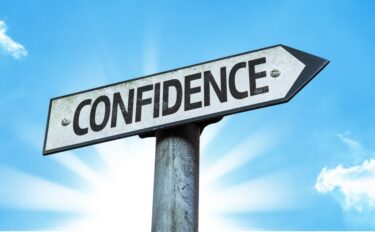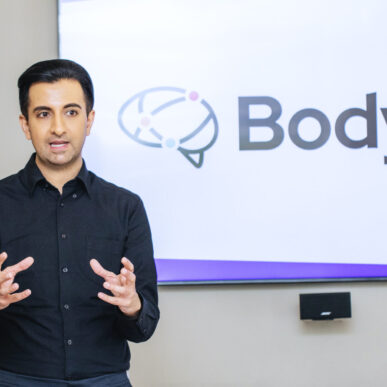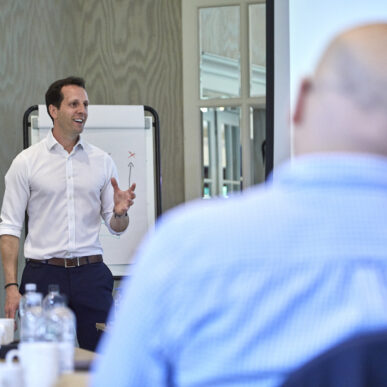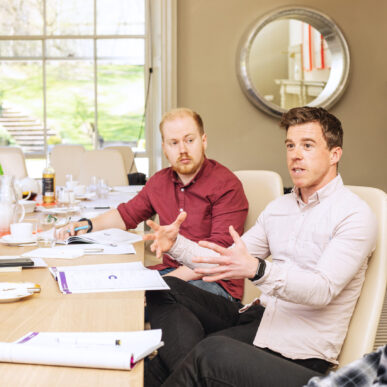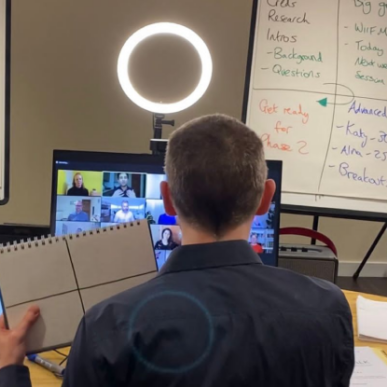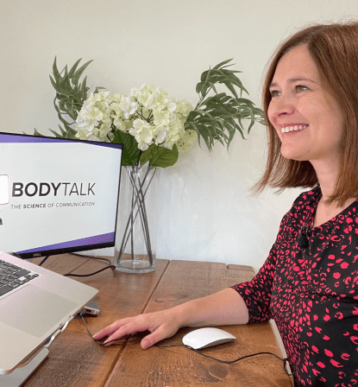‘Think back to a time when you did something well. Hold on to that memory and tell yourself that you did it before so you can do it again. ‘
How To Look And Feel More Confident (Even If You’re Not)
West End performers, BBC broadcasters, TV actors and high-performance race instructors –the Body Talk training team come from a wide range of disciplines. What we all have in common is learning how to have the confidence to communicate ideas in high-pressure environments effectively.
Do we still feel nervous or anxious performing to thousands of people (or even millions on live TV)? Of course we do. Even experienced broadcasters and performers have moments of self-doubt, anxiety and butterflies which won’t stop fluttering!
For all our experience, we still get nervous in front of audiences, large or small. And the truth is you will too. The difference is this: We know how to harness the anxiety, or nervous energy, which allows us to communicate our message and give the impression of competence, calm and control.
You should know this is a learned skill – almost no one does this naturally – and I’m going to share with you three strategies you can implement immediately to boost your confidence and improve your effectiveness in front of an audience.
First, let me dig a bit deeper into why we all find it so uncomfortable being the centre of attention speaking to a group of strangers. Or friends. Or colleagues. Or potential customers.
WHAT’S HOLDING YOU BACK?
You’ve probably heard of Imposter Syndrome, a feeling of inadequacy or limiting beliefs about your abilities. This mindset is more common than you might think, especially in high-performing individuals. Consider what Albert Einstein famously remarked about his fabled career:
“The exaggerated esteem in which my lifework is held makes me very ill at ease. I feel compelled to think of myself as an involuntary swindler.”
More recently, Facebook’s Sheryl Sandberg wrote in her book, Lean In, how she didn’t feel she deserved to be a member of the Phi Beta Kappa Honour Society at Harvard.
“Every time I took a test, I was sure that it had gone badly. And every time I didn’t embarrass myself — or even excelled — I believed that I had fooled everyone yet again. One day soon, the jig would be up…There are still days when I wake up feeling like a fraud, not sure I should be where I am.”
We drilled further into this aspect of personal psychology in a previous Body Talk podcast with Business Psychologist Fiona Kearns. Fiona spoke about the impacts Imposter Syndrome can have on confidence and wellbeing. She prescribed a solution for managing your thoughts and beliefs, which is crucial for dealing with your inner critic. Her recommendation was to write down all the successes you’ve had in your career, the moments where you excelled or helped someone else to succeed. Remind yourself of your achievements and why you are where you are today. She also spoke to understanding where the negative voice originates. Often, it comes from a place of safety; it’s your subconscious trying to protect you. Once you can acknowledge why it’s happening, you can work towards a solution by beginning to have a conversation with yourself and reason with your inner critic.
CONTROL YOUR CHIMP
Professor Steve Peters agrees. He talks about this in his book, The Chimp Paradox. Steve is a Consultant Psychiatrist and helped the GB Olympic Cycling team to success in 2012. He improved their performance by recognising how their emotions (their chimp!) can sometimes sabotage their happiness. You can act in your own best interest and challenge your inner critic by taking control of your emotions.
What does all this mean to you and your confidence? The point is acknowledging your negative voice and anxiety is a first step in becoming more confident. Reminding yourself of your achievements and credibility, as Fiona suggested, can be very effective in quietening your inner critic. Remember to write good things down, create a positivity journal and seek supportive feedback from your peers.
Here are three core strategies to help you feel more confident:
THINK IT & SAY IT
Use positive ‘I am…’ affirmations.
I am excellent at my job
I’m going to nail this interview
I am the right person to lead this team
Be aware, we generally hear assertions in their purest form, so telling yourself, ‘I’m not going to muck this up’ is not helpful as we’re more likely to hear ‘muck this up!’ Say, ‘I am going to be brilliant’ instead. Think back to a time when you did something well. Hold on to that memory and tell yourself that you did it before so you can do it again.
Also, project forward to how well the presentation/interview/meeting will go and how great you’ll feel afterwards. Harness that positive energy because what’s focal is causal. If you focus on things going wrong, it’s much more likely they will!
EMBODY IT
Take up more space. When we feel nervous or uncomfortable, we tend to make ourselves small, perhaps hoping that people can’t see us! We may slump, avoid eye contact, and minimise gestures. By taking up more physical space, you can both appear and feel more confident. Sit up straight with a lifted sternum, and if you’re not sitting, stand with feet shoulder-width apart. Avoid unnecessary movement and fidgeting, and gesture to the size of your audience. If you’re face-to-face, make eye contact with everyone in the room; if you’re in a virtual setting, look at the camera as much as possible.
VOICE IT
A standard indicator of nerves is when your speech starts to speed up. You get faster and faster in the hope you can get to the end as quickly as possible. Slow. It. Down. A calm and well-paced voice gives the impression of confidence; it also gives you more time to think about what you’re going to say next.
Be aware of your pitch. When we’re under pressure, the higher notes in our vocal range tend to come out; combine that with a fast pace, and it’s a perfect recipe for displaying nerves. Going up in pitch at the end of a sentence when you’re not asking a question can also indicate a lack of confidence; it sounds like you doubt yourself. Lower notes, a slower pace, and well-timed pauses are all key to increasing your confidence.
Avoid the following words and phrases and make your audience have more confidence in you.
‘Just’ – it diminishes your impact and your ideas. It’s almost like saying sorry, and many of us needlessly apologise. “I just had a thought” or “I just need a moment of your time” – it’s a filler word. Lose it.
‘I hate to bother you’ – this is saying their time is more important than yours. Know your worth.
Excessive umms and errs – a few are OK; we all use them. But if we punctuate every sentence with these ‘filler’ sounds, you can come across as nervous and unsure. We tend to use them to replace silence, instead, try using a pause when you feel an ummm about to come out of your mouth.
Finally, remember you are not alone in needing these confidence tools. In fact, you’re in great company and by applying these techniques you can gain more of the results you deserve in moments that matter.
